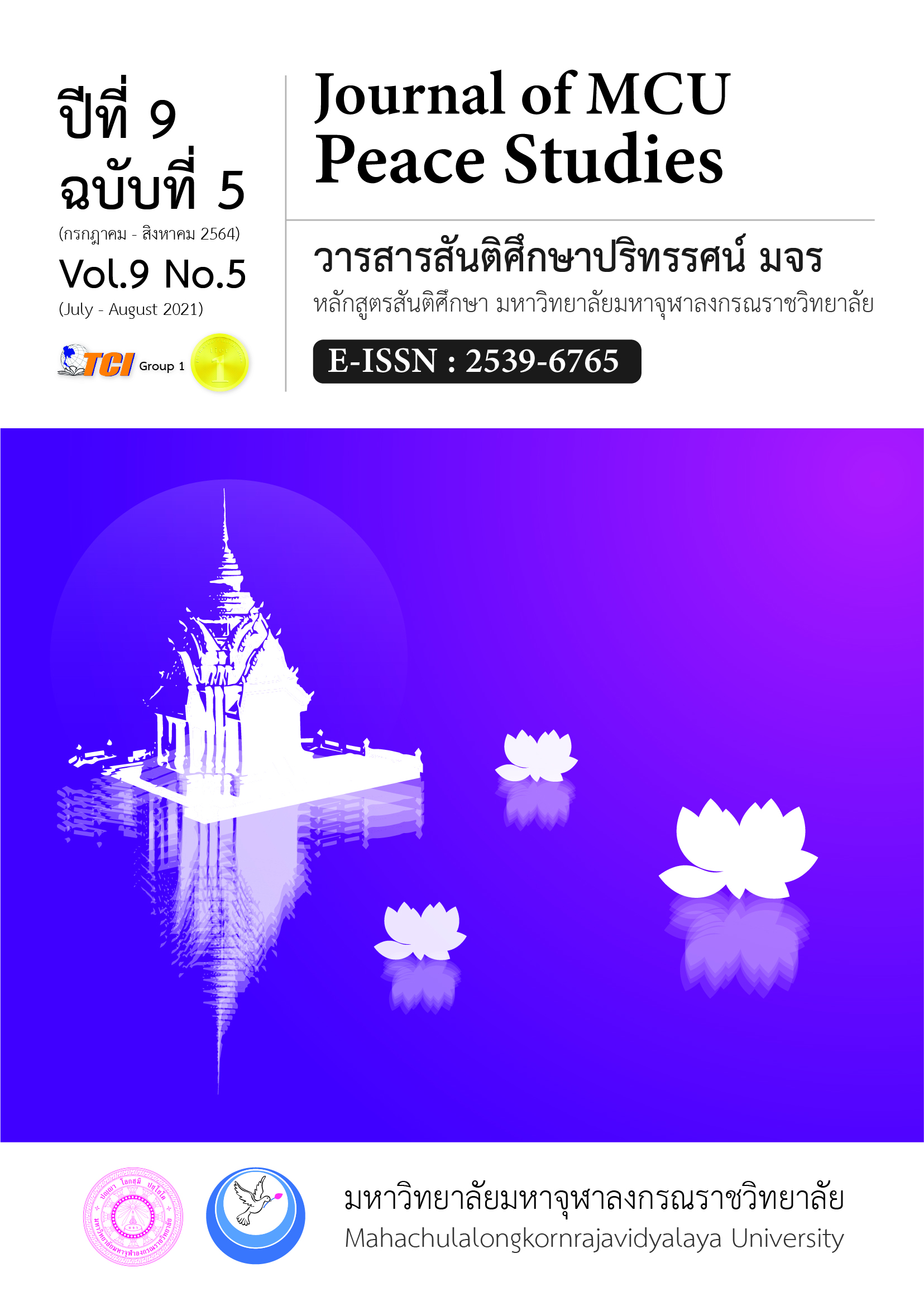การสร้างความปรองดองภายใต้ระบอบประชาธิปไตย
Main Article Content
บทคัดย่อ
บทความวิจัยนี้มีวัตถุประสงค์เพื่อศึกษา 1) บริบททางการเมือง ความขัดแย้ง และการสร้างความปรองดองภายใต้ระบอบประชาธิปไตย 2) บริบททางการเมือง ความขัดแย้ง ที่ส่งผลต่อการสร้างความปรองดองภาย ใต้ระบอบประชาธิปไตย และ 3) ศึกษาแนวทางในการสร้างความปรองดองภายใต้ระบอบประชาธิปไตย ใช้การวิจัยเชิงคุณภาพ ศึกษาจากเอกสารและการสัมภาษณ์เชิงลึก กลุ่มตัวอย่างประกอบด้วย นักการเมือง สื่อมวลชน และนักวิชาการ ด้วยแบบสัมภาษณ์กึ่งโครงสร้าง จำนวน 17 คน ผลการวิจัยพบว่า 1) นโยบายประชานิยมทำให้โครงสร้างทางการเมืองเปลี่ยนแปลงส่งผลให้รัฐไม่ต้องพึ่งชนชั้นกลาง การเอื้อประโยชน์เฉพาะกลุ่มธุรกิจเป็นพวกพ้อง มีการแทรกแซงระบบราชการ ครอบงำสื่อมวลชน องค์กรอิสระ แย่งชิงอำนาจผลประโยชน์ของนักการเมืองที่ทุจริตร่วมกับข้าราชการ นักธุรกิจการเมือง องค์กรอิสระถูกครอบงำโดยอำนาจฝ่ายการเมือง ทหารใช้เหตุการณ์ความขัดแย้งอ้างความชอบธรรม ในการทำรัฐประหาร 2) ประชาชนขาดความรู้ในระบอบประชาธิปไตย เนื่องจากไม่มีผู้นำประเทศ การแสวงหาผลประโยชน์ รวมทั้งใช้อิทธิพลเข้าถึงทรัพยากรของรัฐ ซึ่งความเหลื่อมล้ำเศรษฐกิจและสังคมจะเกี่ยวข้องสัมพันธ์กันเสมอ การไม่เปิดโอกาสให้ประชาชนมีส่วนร่วมในกระบวนการยุติธรรม ความรู้สึกถึงความไม่เป็นธรรมเป็นเครื่องมือสู่อำนาจของนักการเมือง 3) แนวทางการสร้างความปรองดองต้องอาศัยเวลาแก้ไข เยียวยา และป้องกันความขัดแย้งในอนาคต ด้วยการยุติการเผชิญหน้า สร้างความไว้วางใจ เพื่อให้เกิดความยุติธรรมอย่างเสมอภาค ฟื้นฟูส่งเสริมความสัมพันธ์ แลกเปลี่ยนมุมมอง การวิจัยครั้งนี้รัฐบาล กลุ่มการเมืองทุกฝ่าย ที่มีส่วนเกี่ยวข้องกับความขัดแย้ง สื่อมวลชน และประชาชนจะได้มีความเข้าใจต่อความเป็นประชาธิปไตยที่ถูกต้อง สามารถนำไปเผยแพร่ข้อเท็จจริงของเหตุการณ์ความขัดแย้งไปเป็นบทเรียน สามารถก้าวข้ามความขัดแย้งไปสู่ความปรองดองที่ยั่งยืนต่อไป
Article Details
ทัศนะและความคิดเห็นที่ปรากฏในบทความในวารสาร ถือเป็นความรับผิดชอบของผู้เขียนบทความนั้น และไม่ถือเป็นทัศนะและความรับผิดชอบของกองบรรณาธิการ ยินยอมว่าบทความเป็นลิขสิทธิ์ของวารสาร
เอกสารอ้างอิง
Abu-Nimer, M. (2001). Reconciliation, Justice, and Coexistence: Theory and Practice. Lanham, MD: Lexington Books.
Cappo, T., & Maeson, C. (2018). Solution Guideline of Political Violence problem in Thailand. Journal of Mahachulalongkornrajavidyalaya Journal of Education, 5(1), 43-44.
Chaicharoenwattana, B., & Renumat, L. (2 0 1 7 ) . Peaceful Means: Conflict Management in accordance with peaceful means. Journal of Peace Studies, MCU, 5(2), 1-16.
Cogco, T., & Masorn, C. (2 0 1 8 ) . Guidelines for solving Thai political violence. Journal of Mahachulalongkornrajavidyalaya Journal, 5(1), 31-45.
Galtung, J. (1990). Cultural violence. Journal of Peace Research, 27(3), 291-305.
Glunpromsuwan, W. (2014). The process of involvement with reconciliation for reform in the northeast region. Ratchaphruek Journal, 12(3), 10-16.
Inthasi, W. (2002). Effect of reconciliation between North Korea and South Korea on security in East Asia. Bangkok: Thammasat University Research Fund.
Kaewkhan, N. ( 2013) . Development of forgiveness in the present Thai society. (Doctoral Dissertation). Mahachulalongkornrajavidyalaya University. Ayutthaya.
King Prajadhipok’s Institute. (n.d.). Suchinda Kraprayoon. Retrieved August 1, 2018, from http://wiki.kpi.ac.th/index.php?title=สุจินดา_คราประยูร
King Prajadhipok's Institute. (2012). National reconciliation. Research report, King Prajadhipok's Institute. Journal of the Humanities, 17(2), 208-250.
Klanklamsuwan, W. (2014). The process of involvement with reconciliation for reform in the northeast region. Journal Ratchaphruek, 12(3), 10-16.
krisanaseranee, T. (2008). Political attitudes of military students in the Army Chief of Staff School Main Course, Set 86, for the Coup 19 September 2006. (Doctoral Dissertation). Burapha University. Chonburi.
Moore, C, W. (2003). The Mediation Process: Practical Strategies for Resolving Conflict. (3rd ed.). CA: Jossey-Bass.
Murphy, C. (2010). A moral theory of political reconciliation. Cambridge: Cambridge University Press.
Nuchpiumi, P. ( 2017) . Access to justice and good governance. Nonthaburi: Sukhothai Thammathirat Open University.
Phra Thep Pariyatmethi (Sarit Siritharo). ( 2012) . The process of reconciliation in Thai society according to the Buddhist pattern. Social Sciences Research and Academic Journal, 10(29), 39-54.
Phuthaun, S. (1998). Theory of political development. (6th ed.). Bangkok: Ramkhamhaeng University.
Potjanaworaphong, N. et al. (2001). Political history information Thailand: Road events Important politics Important, 1932-present the people's council holds Political power. (4th ed.). Bangkok: Kwan Khao.
Pratheuangrattana, C. (2017). Reconciliation After Violence in Rwanda: Lesson for Thai Society. Nonthaburi: King Prajadhipok's Institute.
Royal Academy. (1999). Royal Institute Dictionary, 1999. Bangkok: Nanmeebooks.
Saenwong, K. (2012). Development and correction of social inequality in Bangkok: a case study of Khlong Sue Sue - Ratchadaphisek community. Journal of Applied Liberal Arts, 5(1), 46-53.
Samudavanich, C. (1987). Problems of Thai political development. Bangkok: Chulalongkorn University.
Samudavanija, C. (2011). Problems of political development. Bangkok: Chulalongkorn University.
Sanwong, K. (2012). The development and problem solving on social inequality in Bangkok: a case study in Bangsue - Ratchadapisek canal community. The Journal of Faculty of Applied Arts, 5(1), 46-53.
Sasin Graduate Institute of Business Administration of Chulalongkorn University (2011). Research project In-depth policy on the development of the quality of life of people and Thai society under the context of cultural change and changes in the modern world after the economic crisis. Retrieved August 1, 2018, from http://social.nesdb.go.th/
Satha-Anand, C. (2003). Arwhut mee cheewit: naewkid cheung wiphak waduay kwam runraeng (Living weapons: Critical Approach to Violence). Bangkok: Fah Diew Kan.
Sripochangkun, S. (2015). Forgiveness and reconciliation. Journal of Public Administration and Politics, 4(1), 1-29.
Sriwittaya, S. (2015). Rule of law and reconciliation. Pathum Thani: Research Department, Rangsit University.
Thanasathit, U. (2013). studied the role of the Political Development Council and the promotion of national reconciliation. Bangkok: University of the Thai Chamber of Commerce.
Thirathiti, C. (2008). Words and ideas in contemporary political science. (2nd ed.). Bangkok: Chulalongkorn University.
Toothongkum, T. (2018). The direction and future of politics in cities and metropolises. Nonthaburi: Sukhothai Thammathirat Open University.
Yenjaima, R., & Suyaporm, S. (2018). Conflict in Society: Theory and Solution. Journal of MCU Social Science Review, 7(2), 224-238.


